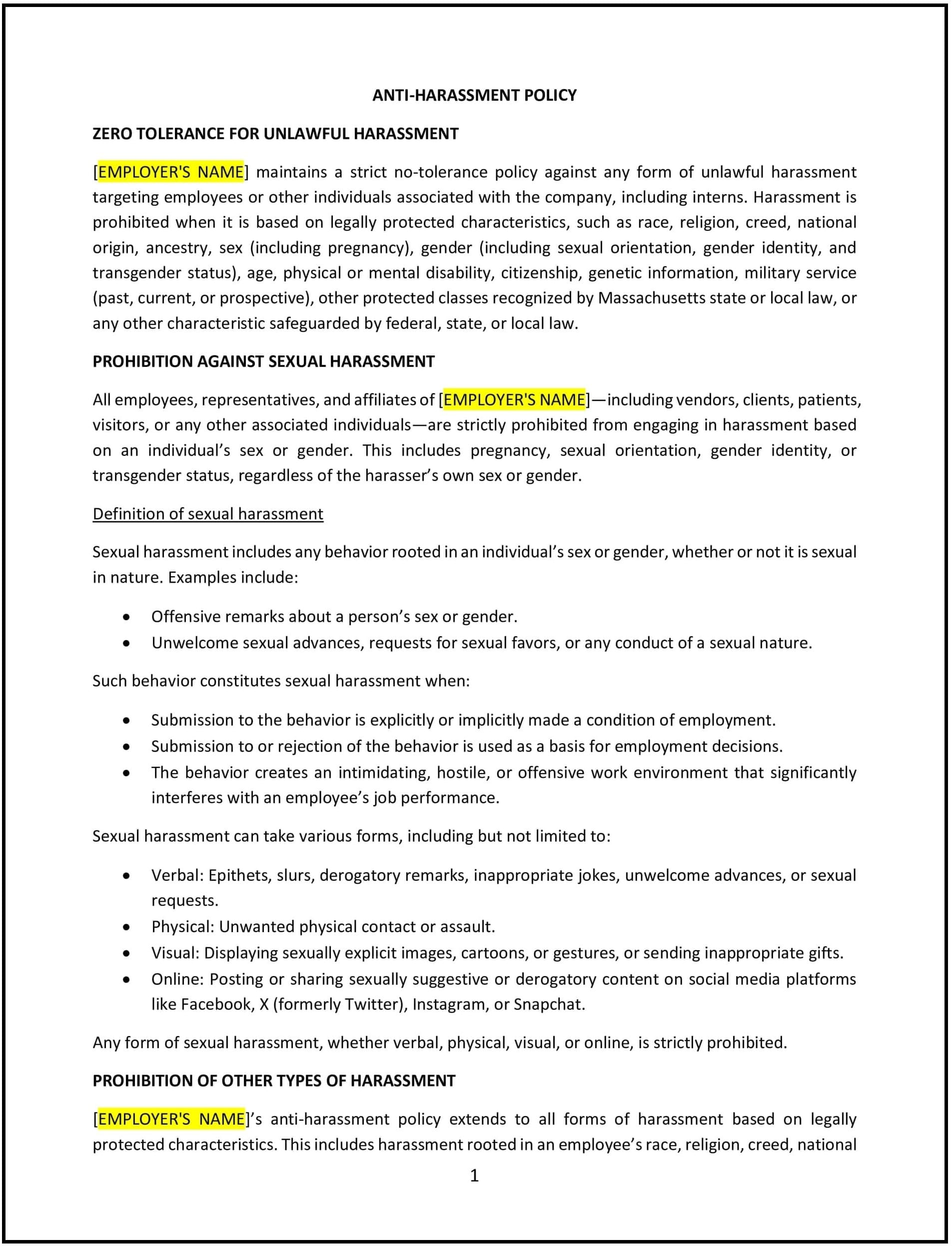Anti-harassment policy (Massachusetts): Free template
Got contracts to review? While you're here for policies, let Cobrief make contract review effortless—start your free review now.

Customize this template for free
This anti-harassment policy is designed to help Massachusetts businesses establish clear guidelines for preventing and addressing harassment in the workplace. The policy defines various types of harassment, including sexual harassment, racial harassment, and other forms of discrimination, and outlines the steps employees should take if they experience or witness harassment. It also specifies the company's commitment to maintaining a respectful and inclusive workplace where all employees are treated with dignity and respect.
By adopting this policy, businesses can promote a positive work environment, enhance legal compliance with Massachusetts state laws and federal regulations, and minimize the risk of harassment-related claims.
How to use this anti-harassment policy (Massachusetts)
- Define harassment: Clearly define what constitutes harassment, including verbal, physical, and visual conduct that creates an intimidating, hostile, or offensive work environment. This includes behavior based on race, gender, sexual orientation, religion, disability, or any other protected characteristic.
- Establish a zero-tolerance policy: Clearly state the company’s zero-tolerance stance on harassment and discrimination. Specify that all forms of harassment, whether by employees, supervisors, or third parties (e.g., customers or contractors), will not be tolerated.
- Outline reporting procedures: Provide clear instructions on how employees can report incidents of harassment. The policy should specify multiple reporting channels, such as HR, a designated reporting hotline, or a supervisor. The process should ensure confidentiality and protect employees from retaliation.
- Set investigation procedures: Specify how the company will investigate harassment complaints, including the steps involved, timelines for resolution, and the types of actions that will be taken if harassment is found to have occurred. The investigation should be impartial and thorough.
- Promote a respectful workplace: Encourage all employees to treat each other with respect and professionalism. Provide guidelines for maintaining a positive workplace culture, including appropriate conduct and communication.
- Outline consequences for harassment: Clearly state the potential consequences for employees found to have engaged in harassment, including disciplinary actions such as warnings, suspension, or termination. The policy should also outline the consequences for false accusations of harassment.
- Address retaliation: Ensure the policy clearly states that employees will not face retaliation for reporting harassment or participating in investigations. The company should emphasize that retaliation is prohibited and will lead to disciplinary action.
- Ensure compliance with Massachusetts state and federal laws: The policy should comply with Massachusetts state laws, such as the Massachusetts Fair Employment Practices Act, and federal laws, including Title VII of the Civil Rights Act of 1964, which prohibits harassment in the workplace.
Benefits of using this anti-harassment policy (Massachusetts)
This policy offers several benefits for Massachusetts businesses:
- Promotes a respectful work environment: By addressing harassment proactively, businesses can foster a culture of respect, where employees feel safe and valued.
- Reduces legal risks: A clearly defined and well-communicated anti-harassment policy helps reduce the risk of lawsuits related to workplace harassment, demonstrating that the company takes such issues seriously.
- Increases employee satisfaction: Employees who feel safe and respected at work are more likely to be engaged and productive, leading to higher job satisfaction and retention rates.
- Protects company reputation: A company that addresses harassment in a clear and effective manner is seen as a responsible employer and can enhance its reputation as a fair and ethical organization.
- Promotes legal compliance: The policy promotes compliance with Massachusetts state laws and federal anti-discrimination and anti-harassment regulations, helping businesses avoid potential legal liabilities.
- Encourages reporting of incidents: Clear reporting procedures and the assurance of non-retaliation encourage employees to report harassment incidents, helping the company address issues early and maintain a safe workplace.
Tips for using this anti-harassment policy (Massachusetts)
- Communicate the policy clearly: Ensure that all employees are aware of the anti-harassment policy, including how to report harassment, the company’s expectations for conduct, and the consequences of violating the policy.
- Provide regular training: Offer training on harassment prevention and awareness, ensuring employees understand what constitutes harassment and how to prevent it. This training should also include information on how to report incidents and participate in investigations.
- Foster an inclusive workplace culture: Encourage a culture where respect, inclusion, and professionalism are prioritized. Promote diversity and create opportunities for employees to engage in open discussions about workplace conduct.
- Maintain confidentiality during investigations: Ensure that all harassment complaints are handled confidentially to protect the privacy of the individuals involved and prevent any further harm.
- Be consistent in applying the policy: Ensure the policy is applied consistently across all employees, regardless of position or seniority, to prevent claims of favoritism or unequal treatment.
- Review and update regularly: Periodically review the policy to ensure it is compliant with Massachusetts state laws, federal regulations, and any changes in company practices or industry standards.